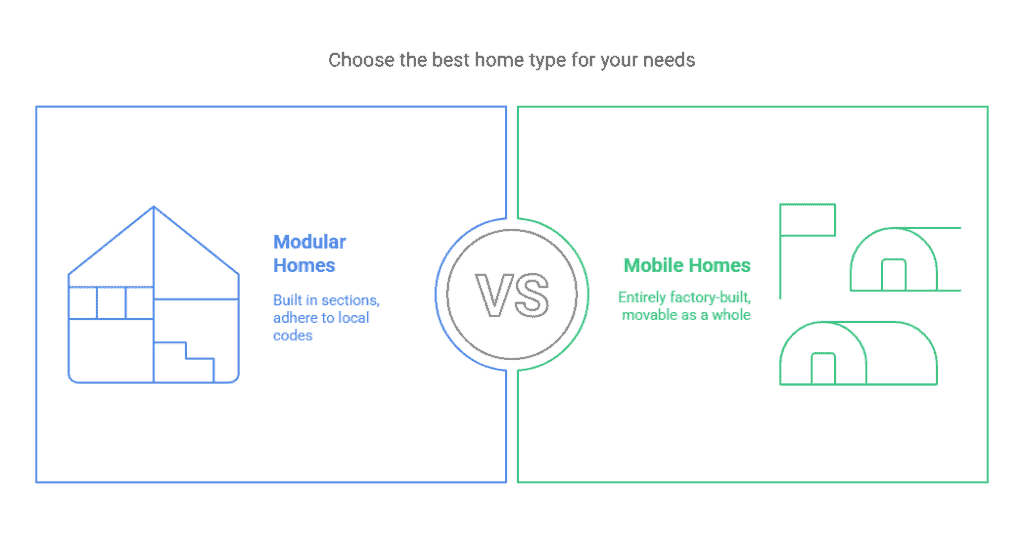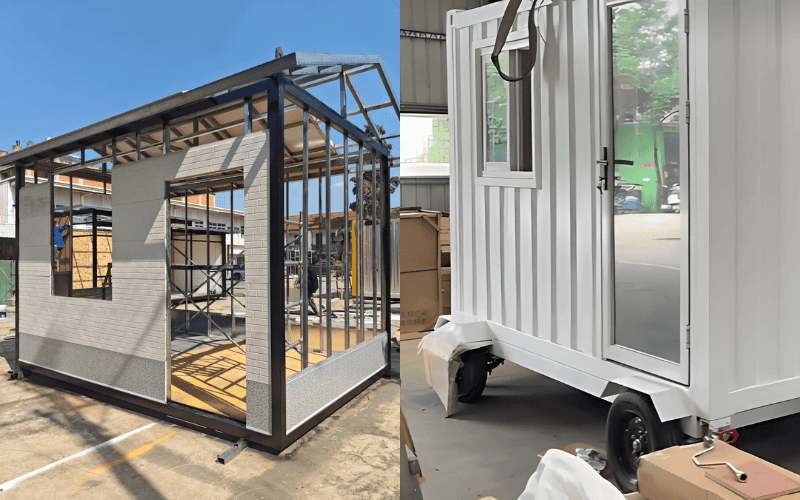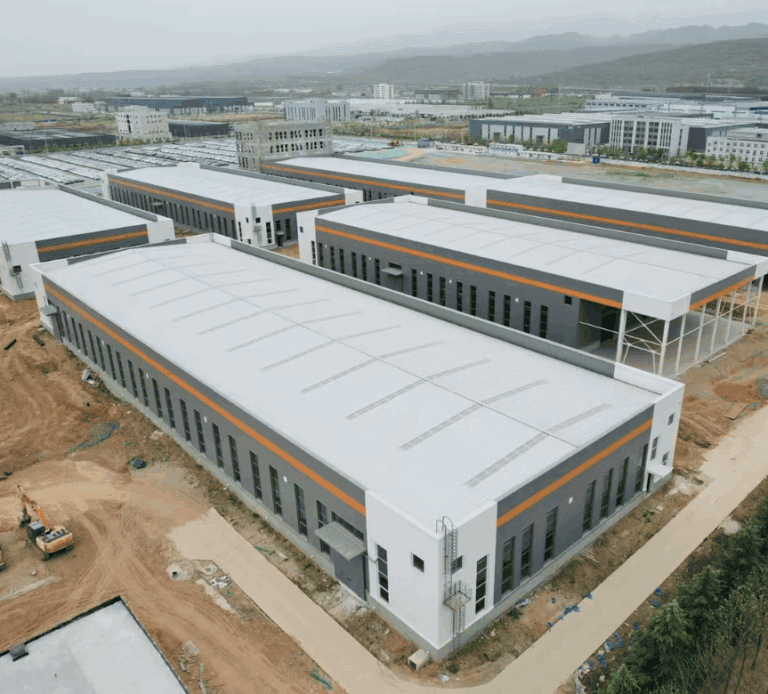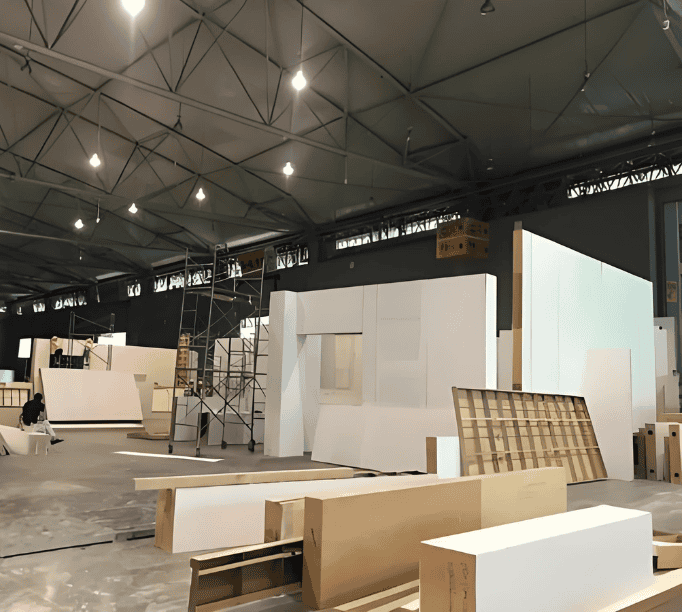Have you ever imagined owning an ideal home that is both affordable and quick to move into? With high housing prices and a fast pace of life, more and more people are turning their attention to prefabricated homes – they are formed in factories like Lego blocks, but can take root in half the time and cost of traditional housing. But when you search for “affordable housing solutions”, are you also confused by the two similar concepts of Modular Home and Mobile Home?
Don’t worry, this is exactly the meaning of this article. They all seem to solve the pain point of “quickly settling down”, but in fact, there are huge differences in ownership, construction standards and long-term value. Some people mistakenly believe that “houses on wheels” can take a trip at any time, and some people worry that prefabricated houses are “cheap tin houses” – next, we will tear off the labels and use real data and cases to reveal the truth about these two types of housing and help you find the key that best matches your stage of life.
What is a Modular Home?
A “Modular Home” is a type of house that is prefabricated in a factory and then transported to the site for assembly. Unlike traditional on-site construction methods, the modules of a modular home (such as bedrooms, kitchens, bathrooms, etc.) are manufactured in a controlled environment, with a high degree of completion and quick assembly, so it is also called a “prefabricated home” or “factory-made home.”
Common misunderstandings:
- Not a container house: Although both are prefabricated structures, modular homes are usually more comfortable and more like traditional homes.
- Not a temporary building: It can be used as a permanent home, and many modular homes have a service life of more than 30 years.
- Not a cheap product: Although it saves costs compared to traditional house construction, high-end modular homes can also achieve luxurious designs.
What is a Mobile Home?
A “Mobile Home” is a movable home that can be transported to the place of residence as a whole after being manufactured in a factory. It is also called “trailer house” and “manufactured home”, especially after the US HUD (Department of Housing and Urban Development) formulated new standards in 1976, this type of house has a clearer definition.
The core features of Mobile Home:
- Factory manufacturing: The entire house is built in the factory as a whole, not assembled in modules.
- Self-contained chassis: It has axles and trailer chassis, and can theoretically be moved repeatedly.
- Convenient transportation: It can be towed to the destination by a truck.
- Usually placed on rental plots: such as mobile home communities, resorts, rural plots, etc.
- Meet HUD standards (USA): rather than local building codes, which is different from Modular Home.

Modular Home vs Mobile Home: What’s the difference?
Although both Modular Home and Mobile Home are prefabricated buildings, they are very different in many key aspects. Below, we provide a detailed comparison of them from various perspectives, such as construction techniques, legal provisions, expenses, longevity, and more, to assist you in determining which type aligns best with your lifestyle and financial constraints.
| Comparison Category | Modular Home | Mobile Home |
| Construction & Regulations | Built in modules at a factory and assembled on-site; must comply with local building codes (e.g., IRC) | Built entirely in a factory; governed by federal HUD standards nationwide |
| Mobility & Flexibility | Installed on a permanent foundation; not movable once built | Comes with a chassis; can be relocated, ideal for temporary or mobile living |
| Cost Comparison | Generally more expensive, but offers better long-term value | Lower upfront cost, but may depreciate faster |
| Appearance | Looks like a traditional house; wide variety of customizable designs | Usually rectangular, single-story, and simpler in style |
| Durability & Lifespan | Strong structure with a lifespan comparable to site-built homes | Lightweight and shorter lifespan, especially in extreme climates |
| Financing & Property Status | Eligible for standard mortgages; considered real property | Financing options are limited; often classified as personal property |
| Customization | High level of customization in layout, materials, and finishes | Limited customization due to fixed structure |
| Community & Land Restrictions | Can be built in most residential zones if permitted | Subject to zoning restrictions; some areas prohibit mobile home placement |
As you can see, modular homes are more comparable to traditional houses in terms of regulations, safety, lifespan, and resale value. On the other hand, mobile homes are more affordable upfront and better suited for short-term or transitional housing needs.
If you prioritize long-term stability and investment potential, modular options could be the right choice for you. If flexibility and cost savings are more important, mobile homes could work well for you.
Modular Home vs Mobile Home: Which One Is More Durable?
Structural Strength
Modular homes are constructed in compliance with local building codes, mirroring the standards of site-built homes. They’re designed to handle transport and on-site assembly, often making them even sturdier than traditional homes.
Mobile homes, built under federal HUD standards, use lighter materials to allow for transport. While safe, they generally have less structural strength compared to modular homes.
Lifespan
A well-maintained modular home can endure for 50 years or longer, representing a sturdy long-term investment. In contrast, mobile homes generally have a lifespan of approximately 20 to 30 years, contingent upon maintenance and their location. Older models may age faster due to simpler construction and material limitations.
Weather Resistance
Modular homes are better suited for extreme weather like snow, wind, or earthquakes, thanks to stronger framing and a permanent foundation.
Mobile homes are more vulnerable in harsh conditions and require proper anchoring to stay stable during storms or soil shifts.
In short: For long-term durability and weather resistance, modular homes are the stronger choice.
Mobile Home vs Modular Home: Which One Is More Affordable?
Upfront Cost
Mobile homes are usually the cheaper option. A new single-wide mobile home can cost significantly less than a modular home of the same size. This makes them an appealing option for first-time buyers or individuals with limited budgets.
Modular homes, while still more affordable than site-built homes, generally come with a higher initial cost due to stricter building standards, permanent foundations, and higher-quality materials.
Long-Term Value
Modular homes often retain their value or even appreciate over time, particularly when they are situated on owned land. They’re considered real property and can appreciate like a traditional home.
In contrast, mobile homes often depreciate, especially if placed on rented land. They’re typically viewed as personal property, similar to a vehicle, which affects both resale value and financing options.
Hidden Costs
Mobile homes may come with ongoing expenses like lot rent, moving fees (if relocated), and higher insurance rates. Modular homes may require more investment upfront for land preparation and foundation, but usually have lower long-term costs.
If you need the most affordable option right now, a mobile home might fit your budget. But if you’re thinking long-term investment and value, a modular home offers better financial stability.

Mobile Home vs Modular Home: Customization & Expandability
When it comes to making a home truly yours, modular and mobile homes offer very different levels of flexibility.
Modular Home: Highly Customizable
Modular homes support a wide range of design changes, material upgrades, and layout options. You can choose from different floor plans, roof styles, exterior finishes, and even add features like decks, garages, or extra rooms. Many manufacturers also offer custom builds based on your specific needs.
Additionally, modular homes are easier to expand or renovate later on since they follow local building codes—making additions more straightforward and legally approved.
Mobile Home: Limited by Structure and Regulations
Mobile homes offer some options when ordered, like flooring and cabinet finishes, but overall customization is limited. Their structural design is more standardized to meet HUD transport requirements, which makes large modifications or expansions more difficult and sometimes not allowed by code.
The majority of mobile homes are not conducive to future expansion, particularly if they are situated in a mobile home park or on a leased lot.
Modular Home vs Mobile Home: Regulations & Living Restrictions
Understanding legal and zoning rules is crucial before deciding on a modular or mobile home—especially since each type follows different regulatory frameworks.
Zoning & Placement Rules
Modular homes are generally allowed in most residential areas, as long as they meet local zoning laws and building codes. They’re treated like traditional houses and are often eligible for placement in suburban and urban neighborhoods.
Mobile homes, however, are restricted in many cities or communities, especially in areas with strict zoning laws. They are often limited to designated mobile home parks or rural land where zoning allows it.
Building Permits
To place a modular home, you’ll typically need to go through the standard permitting process, just like with a site-built home. This includes inspections, foundation approval, utility hookups, and more.
Mobile homes require different permits, depending on the state and location. If you’re placing it on private land, you’ll still need to meet local rules for anchoring, utilities, and sometimes even HUD compliance checks.
Taxes & Insurance
- Modular homes are considered real property, so you’ll pay property taxes and get standard home insurance.
- Mobile homes, especially if not permanently affixed to land, may be classified as personal property, which changes how they are taxed and insured. Insurance may also cost more due to higher perceived risk.
Modular homes offer more freedom in design, easier expansion, and fewer zoning restrictions—making them more suitable for long-term, stable living. While mobile homes offer accessibility, they may encounter more legal restrictions depending on your geographical location.
Mobile Home vs Modular Home: Application
The decision between a modular home and a mobile home hinges on factors such as your lifestyle, budget, land ownership situation, and long-term objectives. Here’s how to figure out which one may suit you better:
Modular Homes Are Ideal For:
- Long-term homeowners who want to settle down and build equity
- Those looking for custom design options and architectural freedom
- Buyers who already own land or are planning to build on a permanent foundation
- People interested in property value appreciation over time
- Families who need more space, expansion options, or multi-story layouts
A modular home makes sense if you’re planning to stay in one place, want a home that feels like a traditional house, and are thinking about long-term investment and comfort.
Mobile Homes Are Best For:
- First-time homebuyers on a tight budget
- Individuals or couples seeking temporary or flexible housing
- People living in rural areas or in communities that allow mobile homes
- Those who need quick move-in options without major construction delays
- Buyers who prioritize lower upfront costs over long-term value
A mobile home is a smart choice if affordability and fast setup are your main concerns, or if you’re not yet ready to commit to permanent homeownership.
Modular Home or Mobile Home: How Do I Decide?
Still unsure whether a modular or mobile home is right for you? Here’s a simple checklist to help guide your decision based on your needs and circumstances.
Ask Yourself:
- What’s my budget?
- Can I afford the upfront investment of a modular home, or do I need the lower entry point of a mobile home?
- Can I afford the upfront investment of a modular home, or do I need the lower entry point of a mobile home?
- How long do I plan to live here?
- Is this a long-term residence or a temporary solution?
- Is this a long-term residence or a temporary solution?
- Do I own land or plan to buy land?
- Some areas have zoning restrictions that may affect mobile homes.
- Some areas have zoning restrictions that may affect mobile homes.
- Do I need financing?
- Will I need a traditional mortgage (better suited to modular homes) or alternative financing options?
- Will I need a traditional mortgage (better suited to modular homes) or alternative financing options?
- How important is customization?
- Do I want to personalize the layout, expand later, or stick with a ready-to-move-in model?
- Do I want to personalize the layout, expand later, or stick with a ready-to-move-in model?
Quick Decision Guide:
| If You Want… | Choose… |
| Long-term value, durability, and customization | Modular Home |
| Lower cost, faster setup, and mobility | Mobile Home |
Related Reading: Modular vs manufactured vs mobile
Conclusion
Both modular and mobile homes offer valuable solutions depending on your lifestyle, budget, and future plans. Neither option is inherently superior to the other; they simply cater to different needs and purposes.
If you’re looking for a customizable, long-lasting, and investment-friendly home, we invite you to explore our tailored mobile modular homes solutions. It’s not just about where you live—it’s about how you live.

